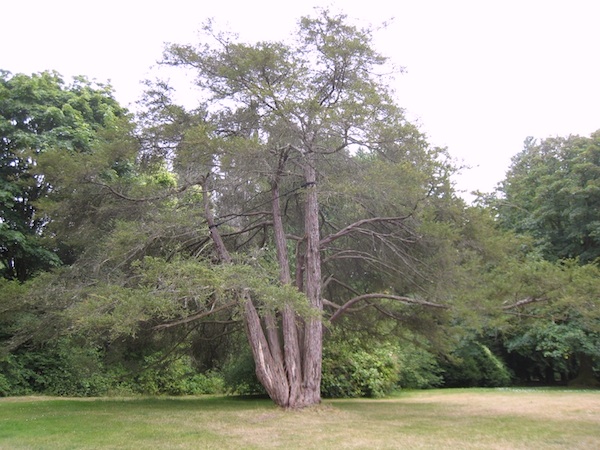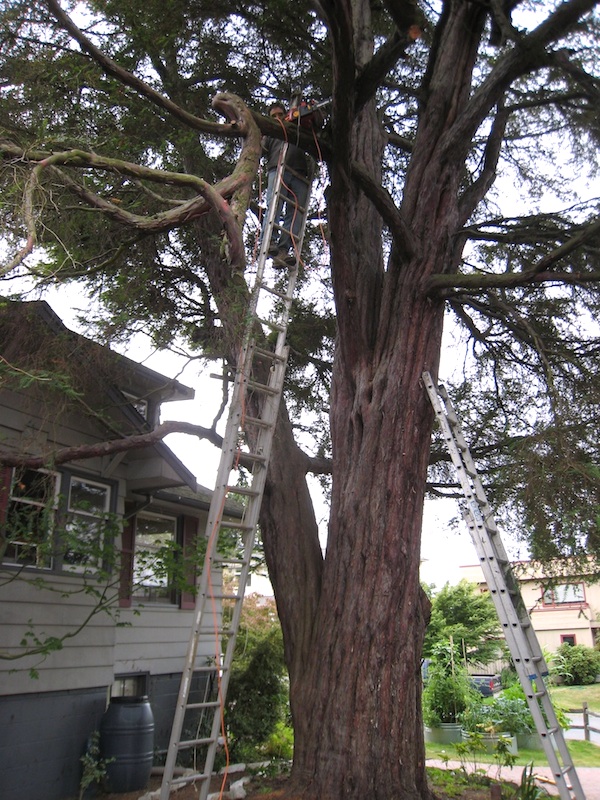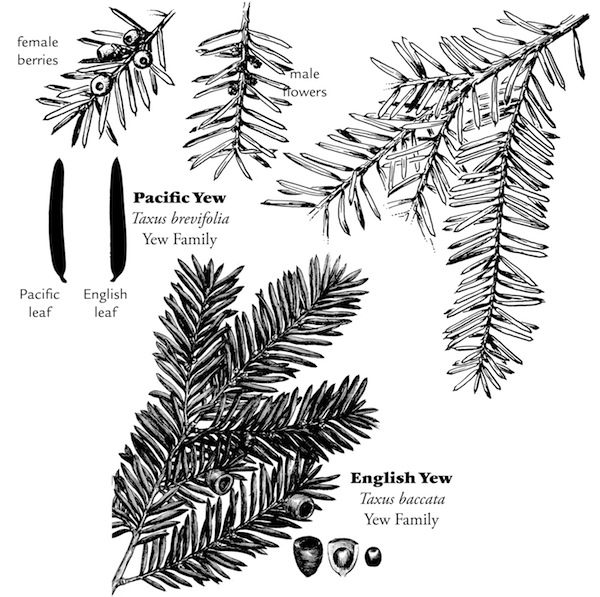| Of the 33 tree species that were, are, or may be native in the city limits of Seattle, Pacific Yew is special. No other native tree grows as slowly --the exact opposite of our fastest, cottonwood. |
| It is also notable for being --in Seattle-- chronically unhealthy and ratty appearing. So as an ornamental, its sparse foliage is a poor shadow of that of the English, Irish, Japanese yews and their hybrids that we cultivate here. (Though its bark, especially when wet, is winsome.) |
| All Taxus species are coniferous evergreens that grow in the northern temperate area; each individual specimen is either a pollen-producing male, or a berry-making female. |
| The first species named, Taxus baccata, is commonly called English Yew even though it ranges throughout Europe, N Africa and SW Asia. It is also by far the most famous, prized for being the oldest tree species in the British Isles (well over 1,500 years); for its wood affording archery bows; for its ancient place and symbolism in churchyards; from its toxicity; from its role as a clipped hedge in ornamental landscape gardening; and from its eery appearance, especially in advanced age. The tallest recorded are over 100 feet; trunks have measured 65 feet in circumference! |
| In Seattle, it is common, and birds such as robins spread its seeds around, so it can be found wild also, in woods and gardens. Many beginning tree students mistake wild English yews in Seattle for our native Pacific yew. Below, I share drawings of both from my book Wild Plants of Greater Seattle. Seattle's tallest English Yew is over 60 feet; the stoutest trunks over 11 feet in circumference. It grows much faster than our native species. |
| The Japanese Yew (Taxus cuspidata), called Ichii (イチイ) in Japanese, is represented in Seattle mostly by hybrids with English Yew, or by dwarf cultivars. In the wild, the largest Japanese yews are up to 82 feet tall; trunks exist over 26 feet around. |
| Pacific yew is native from SE Alaska to central California. Other names are Western or Oregon Yew. It can reach 90 feet tall, and the largest trunks 20 feet around; the oldest some 1,800 years. In the 1990s, taxol was a billion-dollar drug obtained from its bark, used to treat cancer. Now taxol is synthesized, saving many trees. |
Seattle's tallest Pacific yew had been in Seward Park, 64 feet in the 1990s. But it died. Various specimens are stout and wonderfully old. I supply measurements and photos here of Seattle's largest (a male), and Mercer Island's largest (a female). The latter is clearly older and may be more than 600 years. For more trees and data, see the second edition of my book Trees of Seattle.
Back
|

Seattle's largest Pacific Yew tree; photo by ALJ |
| Seattle 2004 or 2005: 38 feet tall, 10 feet 11.5 inches girth and 57.5 feet wide. |
Seattle 2011: 39 feet tall, 11 feet 7 inches girth and 61 feet wide.
|

Mercer Island's largest Pacific Yew tree; photo by ALJ |
| Mercer Island 2004 or 2005: 50 feet tall, 13 feet 1 inches girth and 46.5 feet wide. |
Mercer Island 2011: 51 feet tall, 13 feet 6 inches girth and 51.5 feet wide.
|

yew sketches from page 55 of Wild Plants of Greater Seattle; scan by ALJ
|

